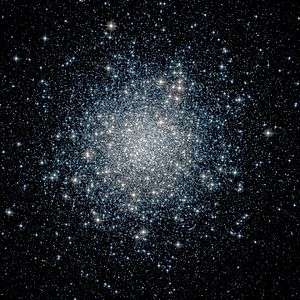NGC 1261
| NGC 1261 | |
|---|---|
|
NGC 1261 from Hubble Legacy Archive | |
| Observation data (J2000.0 epoch) | |
| Class | II[1] |
| Constellation | Horologium |
| Right ascension | 03h 12m 16.21s[2] |
| Declination | –55° 12′ 58.4″[2] |
| Distance | 53.5 kly (16.4 kpc)[3] |
| Apparent magnitude (V) | 8.3 |
| Apparent dimensions (V) | 12.9′ |
| Physical characteristics | |
| Mass | 3.41×105[4] M☉ |
| Metallicity | = –1.08[5] dex |
| Estimated age | 10.24 Gyr[5] |
| Other designations | GCL 5, ESO 155-SC11, Caldwell 87 |
NGC 1261, also known as Caldwell 87, is a globular cluster in the constellation Horologium, first discovered by James Dunlop in 1826.
References
- ↑ Shapley, Harlow; Sawyer, Helen B. (August 1927), "A Classification of Globular Clusters", Harvard College Observatory Bulletin (849): 11–14, Bibcode:1927BHarO.849...11S.
- 1 2 Goldsbury, Ryan; et al. (December 2010), "The ACS Survey of Galactic Globular Clusters. X. New Determinations of Centers for 65 Clusters", The Astronomical Journal, 140 (6): 1830–1837, Bibcode:2010AJ....140.1830G, arXiv:1008.2755
 , doi:10.1088/0004-6256/140/6/1830.
, doi:10.1088/0004-6256/140/6/1830. - ↑ Paust, Nathaniel E. Q.; et al. (February 2010), "The ACS Survey of Galactic Globular Clusters. VIII. Effects of Environment on Globular Cluster Global Mass Functions", The Astronomical Journal, 139 (2): 476–491, Bibcode:2010AJ....139..476P, doi:10.1088/0004-6256/139/2/476.
- ↑ Boyles, J.; et al. (November 2011), "Young Radio Pulsars in Galactic Globular Clusters", The Astrophysical Journal, 742 (1): 51, Bibcode:2011ApJ...742...51B, arXiv:1108.4402
 , doi:10.1088/0004-637X/742/1/51
, doi:10.1088/0004-637X/742/1/51 - 1 2 Forbes, Duncan A.; Bridges, Terry (May 2010), "Accreted versus in situ Milky Way globular clusters", Monthly Notices of the Royal Astronomical Society, 404 (3): 1203–1214, Bibcode:2010MNRAS.404.1203F, arXiv:1001.4289
 , doi:10.1111/j.1365-2966.2010.16373.x.
, doi:10.1111/j.1365-2966.2010.16373.x.
External links
- NGC 1261 on WikiSky: DSS2, SDSS, GALEX, IRAS, Hydrogen α, X-Ray, Astrophoto, Sky Map, Articles and images
- SEDS
- NASA data
- Photometry paper
- Globular Clusters Database
This article is issued from
Wikipedia.
The text is licensed under Creative Commons - Attribution - Sharealike.
Additional terms may apply for the media files.
